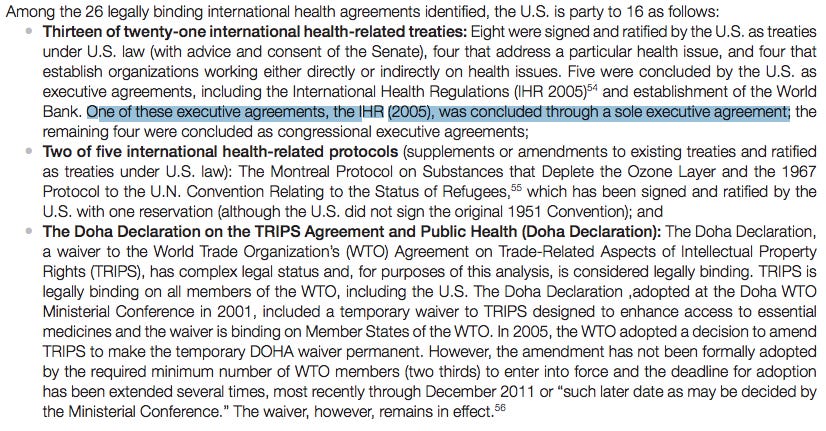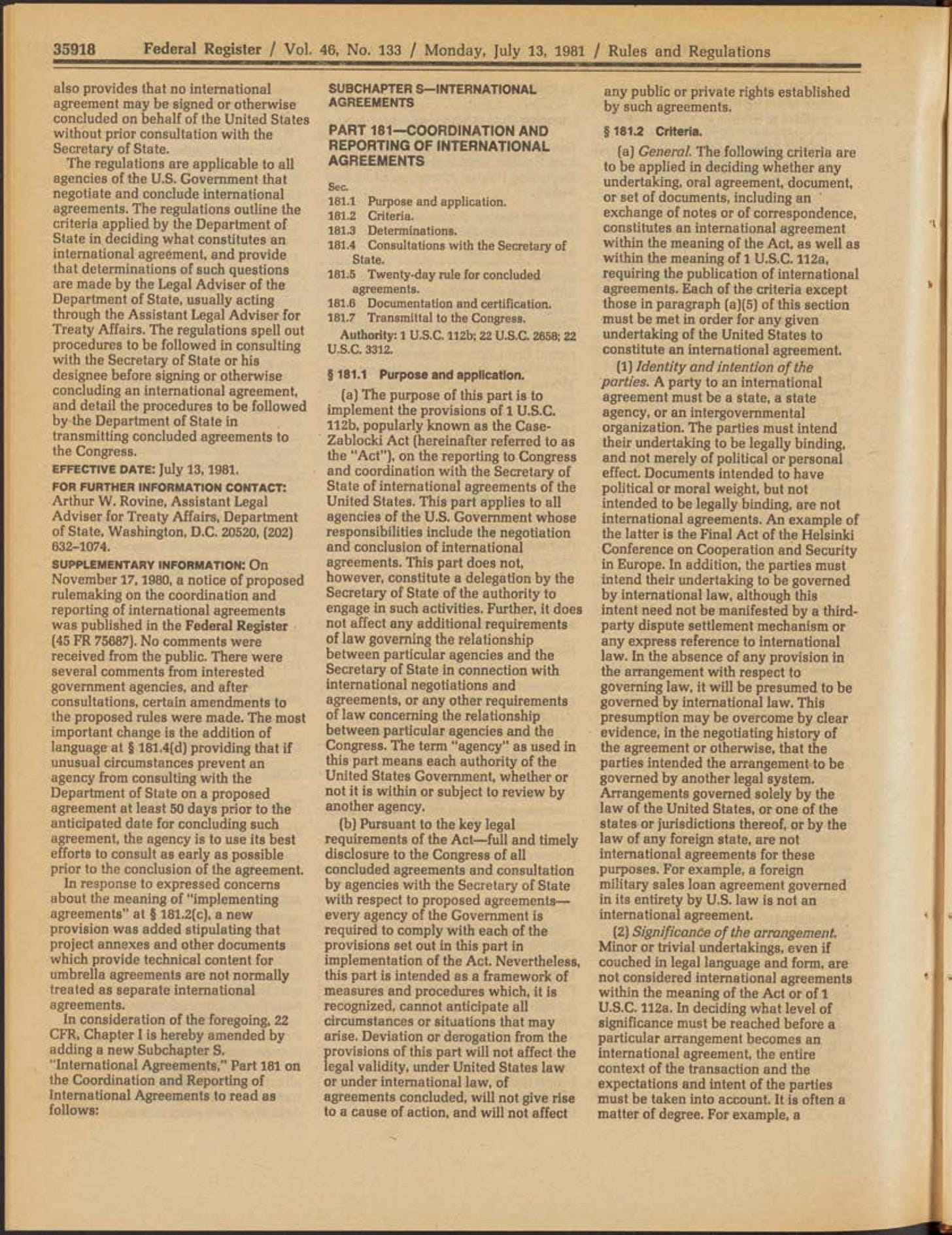Questions
Inquiring minds would really like some answers. Here are just some of the many questions that are worthy of Congressional investigation and public discussion.
The answers to most, if not all, of the questions below should be part of the readily available public record. “We the People” have a right to clear and immediate answers to all of these questions.
Our Congressional Representatives and Senators MUST investigate potential administrative malfeasance regarding the negotiation, drafting and submission of the proposed amendments to the International Health Regulations.
Hopefully, everyone who reads the questions below will give them serious consideration and voice their thoughtful responses in the comment section below.
Please reference the number of the question in your comment.
CROWD SOURCING QUESTIONS:
Also, please feel free to submit additional questions in the comments below.
QUESTION 1:
A) Does the President have the authority to hand over a power that was granted to the President by “We the People?”
B) The power to declare that a state of emergency exists within our nation’s geographical boundaries was granted to the Office of the President. Did President Biden seek the permission of “We the People” to hand over that authority to the Director General (Tedros Adhanom Ghebreyesus) of the World Health Organization?
C) Do you believe that the Executive branch has the legal authority to GIVE AWAY the control of the manner in which a declaration of a state of emergency within the borders of the United States is declared, or must the will of the people be involved?
The United States has submitted the above amendment which would remove the text that is struck through (highlighted in blue) and would leave only the text that is underlined in red. This would effectively relinquish control of the declaration of a public health emergency of international concern (PHEIC) to the complete discretion of the Director-General of the World Health Organization.
ANSWER:
I do not believe that the President has the authority to permanently relinquish the final approval over whether or not a state of emergency may be declared by the World Health Organization within the sovereign geographical territory of the United States.
SOURCE:
Chan Ping v. United States, 130 U.S. 581, 609 (1889).
The powers of government are delegated in trust to the United States, and are incapable of transfer to any other parties. They cannot be abandoned or surrendered.
https://www.law.cornell.edu/supremecourt/text/130/581
QUESTION 2:
A. Does such an action meet the description of “adhering to the enemy” as stated in the legal definition of treason?
B. Is this an act of treason?
ANSWER:
Absent any evidence of ill intent, this appears to be an enormous act of stupidity. If evidence of ill intent can be obtained through FOIA requests or “discovery,” then yes, this may be treason on a massive scale.
SOURCE:
QUESTION 3:
A) When were President Joe Biden, Vice President Kamala Harris and Secretary of State Antony Blinken first informed of these amendments? What did they know and when did they know it?
B) Numerous Congressional Representatives have clearly stated that the negotiations that lead to the amendments was begun during the Trump Administration. Did President Trump order these negotiations to begin? If not, who within the Trump administration was involved?
ANSWER:
Unknown
QUESTION 4:
On January 26, 2022 the “Mission to Geneva” publicly commented on their efforts to “strengthen the International Health Regulations,” but it appears that they never published the proposed amendments that they submitted to the World Health Organization on January 18, 2022.
A. Were the proposed amendments to the International Health Regulations ever published on a U.S. government website?
B. Were they ever published in the Federal Register?
C. If so, when and where were they published?
ANSWER:
Unknown
QUESTION 5:
The Office of the Legal Adviser to the Secretary of State furnishes advice on all legal issues, domestic and international, arising in the course of the State Department's work.
A. Has the Acting Legal Adviser (Richard Visek) determined the proper administrative protocols for this proposed international agreement?
B. Has the Office of the Legal Adviser determined whether these proposed amendments should be handled as
A treaty (requires advice and consent by 2/3 Senate)
A legally binding congressional-executive agreement (pre-authorized by both houses of Congress)
A legally binding congressional-executive agreement (approved by both houses of Congress after signing)
A Sole Executive Agreement (pre-authorized by both houses of Congress)
A Sole Executive Agreement (approved by both houses of Congress after signing)
A non-binding executive agreement (authorized signature)
Other
ANSWER:
Unknown. The International Health Regulations (2005) appear to have been approved as a sole executive agreement. The proposed amendments (2022) go beyond the scope of the 2005 amendments and may need to be recategorized as either a congressional-executive agreement, a treaty or as an unconstitutional over-reach.
SOURCE:
https://www.state.gov/bureaus-offices/secretary-of-state/office-of-the-legal-adviser/
(a) Whether any undertaking, document, or set of documents constitutes or would constitute an international agreement within the meaning of the Act or of 1 U.S.C. 112a shall be determined by the Legal Adviser of the Department of State, a Deputy Legal Adviser, or in most cases the Assistant Legal Adviser for Treaty Affairs.
QUESTION 6:
A. To whom has the Secretary of State (Antony Blinken) officially delegated the authority to negotiate the proposed amendments to the International Health Regulations?
B. If no one has been officially delegated the authority to negotiate these amendments, is this a rogue action conducted by members of the administration?
ANSWER:
Unknown
SOURCE:
QUESTION 7:
A. Has the Secretary of State Antony Blinken been properly consulted regarding the proposed amendments to the International Health Regulations?
B. Have these negotiations been conducted by rogue members of different Departments outside the State Department?
ANSWER:
Unknown
SOURCE:
§ 181.4 Consultations with the Secretary of State.
(a) The Secretary of State is responsible, on behalf of the President, for ensuring that all proposed international agreements of the United States are fully consistent with United States foreign policy objectives. Except as provided in § 181.3(c) of this part, no agency of the U.S. Government may conclude an international agreement, whether entered into in the name of the U.S. Government or in the name of the agency, without prior consultation with the Secretary of State or his designee.
(b) The Secretary of State (or his designee) gives his approval for any proposed agreement negotiated pursuant to his authorization, and his opinion on any proposed agreement negotiated by an agency which has separate authority to negotiate such agreement. The approval or opinion of the Secretary of State or his designee with respect to any proposed international agreement will be given pursuant to Department of State procedures set out in Volume 11, Foreign Affairs Manual, Chapter 700 (Circular 175 procedure). Officers of the Department of State shall be responsible for the preparation of all documents required by the Circular 175 procedure.
(c) Pursuant to the Circular 175 procedure, the approval of, or an opinion on a proposed international agreement to be concluded in the name of the U.S. Government will be given either by the Secretary of State or his designee. The approval of, or opinion on a proposed international agreement to be concluded in the name of a particular agency of the U.S. Government will be given by the interested assistant secretary or secretaries of State, or their designees, unless such official(s) judge that consultation with the Secretary, Deputy Secretary, or an Under Secretary is necessary. The approval of, or opinion on a proposed international agreement will normally be given within 20 days of receipt of the request for consultation and of the information as required by § 181.4(d)-(g).
(d) Any agency wishing to conclude an international agreement shall transmit to the interested bureau or office in the Department of State, or to the Office of the Legal Adviser, for consultation pursuant to this section, a draft text or summary of the proposed agreement, a precise citation of the Constitutional, statutory, or treaty authority for such agreement, and other background information as requested by the Department of State. The transmittal of the draft text or summary and citation of legal authority shall be made before negotiations are undertaken, or if that is not feasible, as early as possible in the negotiating process. In any event such transmittals must be made no later than 50 days prior to the anticipated date for concluding the proposed agreement. If unusual circumstances prevent this 50-day requirement from being met, the concerned agency shall use its best efforts to effect such transmittal as early as possible prior to the anticipated date for concluding the proposed agreement.
(e)
(1) If a proposed agreement embodies a commitment to furnish funds, goods, or services that are beyond or in addition to those authorized in an approved budget, the agency proposing the agreement shall state what arrangements have been planned or carried out concerning consultation with the Office of Management and Budget for such commitment. The Department of State should receive confirmation that the relevant budget approved by the President provides or requests funds adequate to fulfill the proposed commitment, or that the President has made a determination to seek the required funds.
(g) The consultation requirement shall be deemed to be satisfied with respect to proposed international agreements of the United States about which the Secretary of State (or his designee) has been consulted in his capacity as a member of an interagency committee or council established for the purpose of approving such proposed agreements.
QUESTION 8:
On January 18, 2022, Ms. Loyce Pace, the Assistant Secretary of the Office of Global Affairs within the Department of Health and Human Services submitted the proposed amendments to the WHO. It appears that she signed her name over the official seal of the Mission to Geneva.
The signature below is difficult to read.
Whose signature is it?
Is the seal an official seal of the “Mission” to Geneva?
ANSWER:
Unknown
SOURCE:
https://apps.who.int/gb/ebwha/pdf_files/WHA75/A75_18-en.pdf
QUESTION 9:
Was Ms. Pace properly authorized to sign and submit the amendments, or were her actions done under the color of law? Please provide the proper delegation of authority.
ANSWER:
Unknown
QUESTION 10:
Has “The Mission” that is listed in the cover letter to the amendments been properly authorized to speak for the United States in this manner, or is it acting under the color of law? Please provide the proper delegation of authority.
ANSWER:
Unknown
QUESTION 11:
A. Who (if anyone) was officially delegated the authority to submit and agree to these proposed amendments? Who granted the authority and who received it?
B. Were these official delegations of authority published in the Federal Register?
ANSWER:
Unknown
QUESTION 12:
When did the government agencies involved hold a public comment period in order to listen to the concerns of “We the People” regarding the proposed amendments to the International Health Regulations?
ANSWER:
Unknown
QUESTION 13:
Beyond his duties as the Secretary of the Department of Health and Human Services, and his position as Chief Delegate to the World Health Assembly, has Mr. Becerra received an official delegation of authority to to empower him to agree to enter the United States into an international agreement (i.e. to vote for these amendments)?
ANSWER:
Unknown
QUESTION 14:
A) Were the 2005 amendments to the IHR properly approved by both houses of Congress in order to make them legally binding, or was it merely a non-binding executive agreement?
B) Who was given the authorization to submit amendments to the International Health Regulations in 2005 and 2022?
C) Who approved the request to submit amendments to the International Health Regulations in 2005 and 2022?
ANSWER:
Unofficial documents have reported that the International Health Regulations (2005) were passed as a legally binding sole executive agreement, but I have not been able to find any solid evidence to verify that claim.
QUESTION 15:
By law Congress is required to, on a yearly basis, review all treaties, congressional-executive agreements and executive agreements. Can you submit the review that took place in 2020-2021?
ANSWER:
Unknown
QUESTION 16:
Congress has failed miserably in regards to obeying Title 50, Section 1622 of the USC which requires them to vote every six months on a Joint Resolution to end each of the 42 national emergencies that are currently active in the United States.
ANSWER:
None.
SOURCE:
THE PERTINENT SECTION OF THE FEDERAL CODE
SOURCE:
https://archives.federalregister.gov/issue_slice/1981/7/13/35916-35921.pdf#page=2
The questions that I have asked in this article are questions that I should be able to find the answers for in the public record.
Because the answers cannot be found, someone should go jail.
This is the Seventeenth article in this series.
by James Roguski
The old system is crumbling, and we must build its replacement quickly.
If you are fed up with the government, hospital, medical, pharmaceutical, media, industrial complex and would like to help build a holistic alternative to the WHO, then feel free to contact me directly anytime.
JamesRoguski.substack.com/about
JamesRoguski.substack.com/archive
Quick link to EVIDENCE: DontYouDare.INFO
Quick link to ACTIVIST TOOLBOX: StopTheWHO.com
310-619-3055





































Thank you so much for all of this information. Very important to be made aware of this. Much appreciated.
This is amazing work, thank you!
I will forward it around here (Italy) and try to adapt it to local and EU legislation - we ALL need to fight this!